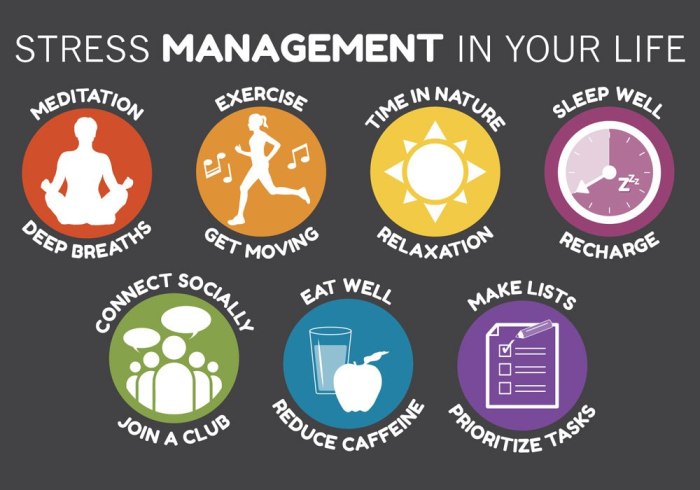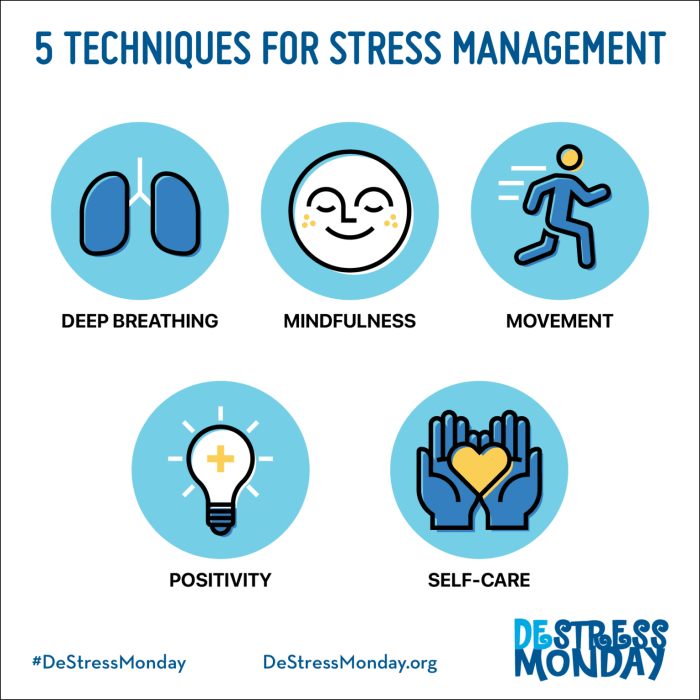Stress Management Tips takes center stage, inviting you on a journey filled with insights and strategies to conquer stress like a boss. Get ready to unlock the secrets of a stress-free life!
In this guide, we’ll delve into the importance of stress management, ways to identify stress triggers, healthy coping mechanisms, mindfulness techniques, time management strategies, the relationship between physical exercise and stress, and more. Let’s dive in!
Introduction to Stress Management

Stress management is the practice of implementing strategies to cope with and reduce stress in our daily lives. It involves techniques and activities that help individuals to better handle the challenges and pressures they face, ultimately leading to improved mental and physical well-being.
Importance of Stress Management, Stress Management Tips
Effective stress management is crucial for overall well-being as it helps to prevent the negative impact of stress on our health. By learning how to manage stress, individuals can improve their mood, increase productivity, enhance relationships, and reduce the risk of developing stress-related illnesses such as anxiety and depression.
- Reduces the risk of health problems: Chronic stress can lead to various health issues such as high blood pressure, heart disease, and weakened immune system. By managing stress effectively, individuals can reduce the risk of developing these health problems.
- Improves mental health: Stress management techniques such as mindfulness, meditation, and exercise can help to reduce symptoms of anxiety and depression, improving overall mental well-being.
- Enhances productivity: When stress levels are high, productivity tends to suffer. By implementing stress management strategies, individuals can improve focus, concentration, and efficiency in their daily tasks.
- Strengthens relationships: Stress can often strain relationships with friends, family, and colleagues. By managing stress effectively, individuals can improve communication, empathy, and support within their relationships.
Identifying Stress Triggers
Identifying stress triggers is crucial in effectively managing stress and maintaining overall well-being. By recognizing what causes stress in our lives, we can take proactive steps to address these triggers and minimize their impact on our mental and physical health.
Common Stress Triggers
- Work-related pressure and deadlines
- Financial concerns and instability
- Relationship issues with family, friends, or colleagues
- Health problems or chronic illnesses
- Major life changes such as moving, starting a new job, or going through a breakup
Physical Signs of Stress
- Headaches or migraines
- Muscle tension and pain
- Fatigue and insomnia
- Upset stomach or digestive issues
Emotional Signs of Stress
- Feelings of anxiety, irritability, or anger
- Overwhelming sadness or depression
- Difficulty concentrating or making decisions
- Increased worry or fear
Behavioral Signs of Stress
- Changes in eating habits – overeating or undereating
- Increased use of alcohol, tobacco, or other substances
- Isolating oneself from social activities or loved ones
- Racing thoughts or constant restlessness
Healthy Coping Mechanisms: Stress Management Tips

In order to effectively manage stress, it is crucial to adopt healthy coping mechanisms that promote overall well-being. These strategies help individuals navigate through challenging situations and build resilience in the face of stressors.
Short-term Coping Strategies vs. Long-term Coping Strategies
Short-term coping strategies are immediate actions taken to reduce stress in the moment, such as deep breathing exercises, mindfulness techniques, or taking a short break. These strategies provide quick relief and can help calm the mind during stressful situations. On the other hand, long-term coping strategies involve developing sustainable habits and lifestyle changes to manage stress over time. This may include regular exercise, maintaining a healthy diet, getting enough sleep, and practicing self-care routines consistently.
While short-term coping strategies offer immediate relief, long-term coping strategies focus on building resilience and improving overall well-being in the long run.
The Importance of Self-care Practices in Stress Management
Self-care practices play a vital role in stress management by promoting mental, emotional, and physical well-being. Engaging in self-care activities such as exercise, meditation, spending time with loved ones, pursuing hobbies, and setting boundaries can help reduce stress levels and improve overall quality of life. Taking time to prioritize self-care allows individuals to recharge, relax, and build resilience against stressors.
It is essential to make self-care a priority in daily routines to maintain optimal mental health and effectively manage stress.
Mindfulness and Relaxation Techniques
Mindfulness is the practice of being fully present and aware of your thoughts, feelings, sensations, and surroundings without judgment. It plays a crucial role in stress reduction by helping individuals manage their emotions and reactions in a more balanced way.
Deep Breathing
Deep breathing involves taking slow, deep breaths to activate the body’s relaxation response. Start by inhaling deeply through your nose, expanding your abdomen, then exhale slowly through your mouth. Repeat this process several times to calm your mind and body.
Meditation
Meditation focuses on quieting the mind and cultivating a sense of inner peace. Find a quiet place, sit or lie down comfortably, and focus on your breath or a specific mantra. Allow thoughts to come and go without judgment, returning your focus to your breath whenever distractions arise.
Progressive Muscle Relaxation
Progressive muscle relaxation involves tensing and then slowly releasing each muscle group in the body to promote physical and mental relaxation. Start with your toes and work your way up to your head, paying attention to the sensations of tension and release in each muscle group.
Benefits of Mindfulness and Relaxation Practices
- Reduced stress and anxiety levels
- Improved focus and cognitive function
- Better sleep quality
- Enhanced emotional regulation
- Increased overall sense of well-being
Time Management and Prioritization
Effective time management plays a crucial role in reducing stress levels by helping individuals stay organized, focused, and on track with their tasks and responsibilities. When we manage our time efficiently, we can avoid last-minute rushes, reduce the chances of forgetting important deadlines, and create a sense of control over our daily activities.
Tips for Prioritizing Tasks
- Start by making a to-do list: Write down all the tasks you need to accomplish, and then prioritize them based on deadlines and importance.
- Use the Eisenhower Matrix: Categorize tasks as urgent and important, important but not urgent, urgent but not important, and neither urgent nor important to determine what needs immediate attention.
- Break down larger tasks: Divide big projects into smaller, manageable steps to prevent feeling overwhelmed and make progress more achievable.
Strategies for Setting Realistic Goals
- Set specific and measurable goals: Clearly define what you want to achieve and establish criteria to track your progress.
- Avoid overcommitting: Be realistic about your capabilities and commitments to prevent taking on too much at once.
- Practice self-discipline: Stay focused on your goals and avoid distractions that may derail your progress.
Physical Exercise and Stress
Regular physical exercise plays a crucial role in managing stress levels. Engaging in physical activity can help reduce stress, improve mood, and boost overall well-being.
Types of Exercises for Stress Management
- Aerobic exercises such as running, swimming, or cycling are excellent for reducing stress levels. These activities help release endorphins, which are known as “feel-good” hormones.
- Strength training exercises like weightlifting or bodyweight exercises can also be beneficial for stress relief. Building physical strength can enhance mental resilience.
- Yoga and Pilates are great options for combining physical activity with mindfulness and relaxation techniques. These practices focus on breathing, flexibility, and mental clarity.
Role of Endorphins and Neurotransmitters
Physical exercise stimulates the release of endorphins, which act as natural painkillers and mood elevators. These chemicals help reduce stress and anxiety levels. Additionally, exercise increases the production of neurotransmitters like serotonin and dopamine, which play a key role in regulating mood and emotions.